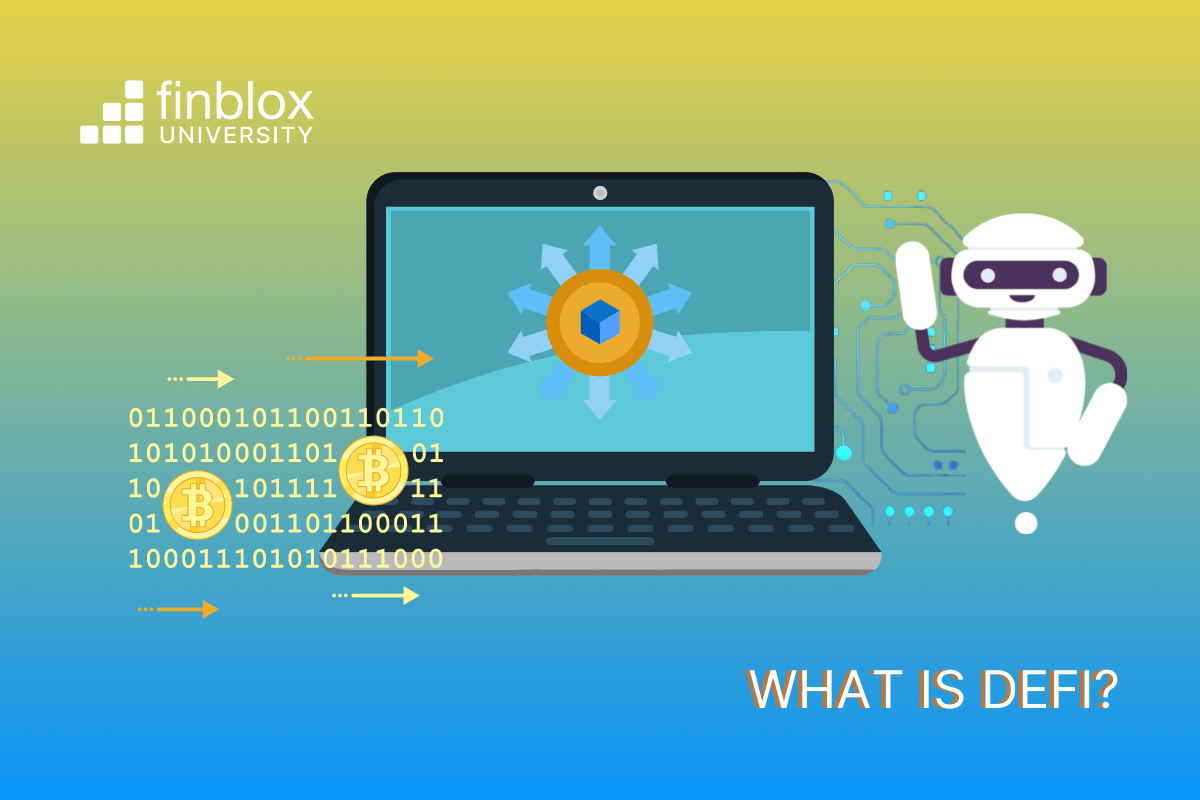Learn all about decentralized finance - including what differentiates it from CeFi, risks, and obscure terms!
Decentralized finance (DeFi) is a relatively new movement and emerging financial system that uses the blockchain and other cryptocurrency applications to offer completely intermediary-free financial services - including borrowing, lending, speculation, trading, and more.
An intermediary is simply an individual or entity that must be present to conduct or oversee a financial service. Your banker is an example of an intermediary, as they must first check your records and approve transactions before handing you cash during a withdrawal. Even an entire corporation can be an intermediary. Ultimately, if there is someone standing between point A and point B in any of the services you receive - that person is an intermediary.
Why is this important to the concept of DeFi, and how do intermediaries impact the overall financial experience? We'll discuss this shortly in the next section.
What's the difference between DeFi and centralized finance?
Centralized finance (CeFi) can be defined as the exact opposite of DeFi - it is a financial system of checks and balances that requires intermediaries to operate. Traditional finance (TradFi) is another term that gets thrown around loosely, and while all TradFi services are centralized - not all CeFi services can be classified as traditional finance (Finblox is one such example). Quite confusing, isn't it?
Here are some key defining factors that make up centralized financial services:
- Requires intermediaries to operate. Since intermediaries must be present to conduct, approve, and process services - there is always a greater chance of delay and slower speeds using CeFi. Furthermore, intermediaries are human beings that require sleep - which means your service might not be available around the clock.
- Prone to human bias and error. Individuals involved in the approval process are subject to their own internal judgment whether they like to admit it or not. You've probably witnessed people being denied service on the basis of their appearance; it should also be no surprise that there can be errors in the filing process.
- Less privacy. While banks and financial institutions do their utmost to only hand your documents to the necessary individuals, that is still a major point of weakness and potential fraud.
- Insurance, guarantees, and refunds. The good news is, centralized services typically offer some kind of insurance or coverage in the event that something goes wrong. For example, the FDIC insures all deposits for up to $250,000 USD. Also, because transactions are being monitored and are bi-directional - it is possible to cancel and even receive a refund for a service you've no longer decided to pursue.
- Customer support is probably the crown jewel of centralized finance. While wait times can be admittedly long, CeFi institutions offer excellent customer service and advice - none of which is present in DeFi.
Finally, here are some of the factors that distinguish DeFi services:
- No intermediaries. DeFi platforms are powered by smart contracts and fully automated. A smart contract is simply a program that is designed to execute automatically upon a certain condition being fulfilled. Because humans aren't involved in the process, you can use DeFi services 24/7 with lightning speed.
- Prone to programming errors, and your own human errors. DeFi platforms are not infallible. Sometimes their code can be exploited by hackers to disastrous effect. Since smart contracts are only designed to follow orders, they can't distinguish or take action if something suspicious is happening. Furthermore, you hold your own private keys and execute transactions. If you make a mistake - it's irrecoverable.
- High degree of privacy. Most DeFi services are anonymous or nearly anonymous. Outsiders can only observe when transactions have occurred between the public keys of different wallets, and the size of the transaction.
- No fail-safe or guarantees. Make a mistake in DeFi, and your funds are 99% lost forever. The backlash of no intermediary is that there are no witnesses or intervention in the event of error. All DeFi transactions are uni-directional and irreversible.
- No customer support. Smart contracts were programmed in such a way to be launched and remain human-tampering free. As a result, there is no technical assistance should you require help.

How safe is DeFi?
Decentralized finance could not be called not "safe" by any means. While it has its advantages, there are a variety of unique risk factors that come into play. We briefly covered smart contract risk in the section above, and acknowledged that automation has a key weakness in not being able to recognize subtle or suspicious activity as long as it meets the criteria for execution.
Liquidity risk is another major risk, since DeFi services often use decentralized exchanges (DEX) which have lower trading volumes. When the trading volume between an asset pair is low, users may experience high difficulty and greater costs executing transactions - due to the gas fee and congestion on that network. Slippage occurs when the expected price you would get for a transaction differs from the actual price. Because prices are constantly in flux, any delay that results from congestion or lower trading volume can have a big effect.
Lending your funds into a DeFi liquidity pool can result in impermanent loss from price divergence. This is because liquidity pools rely on ratios of one asset to another, and are constantly adjusted so that the value remains constant. Investors of the pool are allowed a certain percentage of the profits, but sometimes this "cut" is actually less than what they would have made if they simply held their assets without depositing them into the LP.
Governance attack risk is another threat to DeFi, since all blockchains operate based on consensus. Consensus is simply agreement between more than 50% of the computers on a network - that "something" is correct and will be executed. That "something" could be a transaction, or a piece of code that would change the way a protocol behaves entirely. If a hacker or malicious entity gained a majority of voting power (whether through governance tokens or the computers themselves), they could inflict some serious harm on all participants in the network.
Finally, there is custodial risk. Custodial risk refers to the fact that you are the sole person responsible for the integrity and safekeeping of your funds. Should you commit any errors, the consequences can be severe and without assistance.
What products are commonly used in DeFi?
The most commonly used DeFi products are:
- Borrowing/lending platforms
- Staking/yield-generating platforms
- Decentralized exchanges/swaps
- Decentralized web (also known as Web3)
- NFTs

What are some useful terms to know in DeFi?
- Automated market makers (AMMs) are a type of decentralized exchange that relies on liquidity that is balanced and managed by an algorithm, rather than the typical order book seen in stock exchanges.
- Liquidity pools are basically just giant pools of assets from liquidity providers, used to facilitate trades between a token pair. In return, these liquidity providers usually receive a percentage of profits from the pool and trading fees.
- Decentralized apps (dApps) are programs that are designed to run completely human intervention-free. You can read more on dApps here.
- Collateral describes the crypto assets that act as a counterweight when borrowing crypto from a lender. Because the lender takes risks that you might not return their funds, they are allowed to seize your collateral if you do not repay.
- Aggregators are DeFi protocols that automatically scan different DeFi platforms for the best reward rates. In some cases, they can even automatically move your funds for you.
- Total value locked (TVL) is the sum of all cryptocurrencies that are locked in various DeFi protocols that are being employed by the entity providing a DeFi service. For example, Yearn Finance's TVL would be the dollar value of all the DeFi protocols they use to generate their users yields.
- Yield farming is the practice of using different DeFi services and chaining them together to theoretically create infinite loops (or as long as you can manage) of yield-generating opportunities. You can read more here.
The Takeaway:
"Not your keys, not your coin" is a phrase often used by the most hardcore proponents of decentralized finance. While it is true that DeFi carries its advantages in terms of speed, privacy, and availability of use - one should not take the risks lightly.
Fortunately, if you are looking for a blend of security, insurance, and support from the CeFi world - as well as the speed, privacy, and higher yields of DeFi services - Finblox may be the answer. We feature extremely competitive yields on a wide selection of assets. Furthermore, all of your funds are protected and insured by Fireblocks for up to 45M USD - and our amazingly supportive team is available around the clock to assist. Sign up today and start earning rewards for simply holding!
Thanks for reading! Please subscribe if you haven't already - and stay tuned for our next article, which explains everything you need to know about crypto regulations, KYC, and AML!
This content is provided for informational purposes only, and should not be relied upon as legal, business, investment, or tax advice. You should consult your own advisers as to those matters. Charts, graphs and references to any digital assets are for informational and illustrative purposes only.



